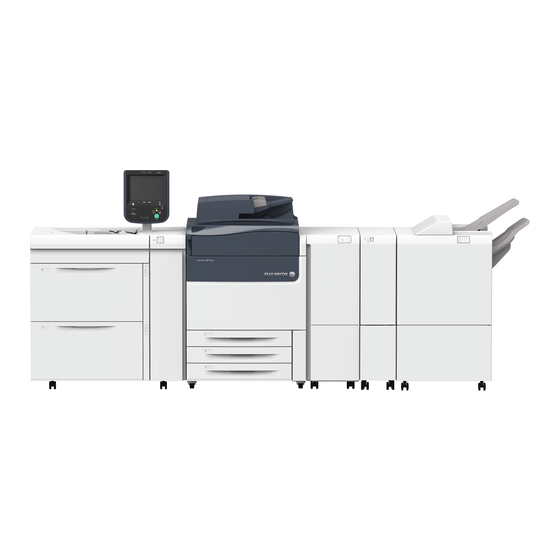Xerox Versant 80 Press Очікування замовника та інструкція по встановленню - Сторінка 30
Переглянути онлайн або завантажити pdf Очікування замовника та інструкція по встановленню для Принтер Xerox Versant 80 Press. Xerox Versant 80 Press 48 сторінок. Entry production color presses
Також для Xerox Versant 80 Press: Посібник з техніки безпеки (26 сторінок), Посібник з безпеки (45 сторінок)

Maintenance and Support
3 Maintenance and Support
Customer/Operator Maintenance
Automated Color Quality Suite (ACQS) (Optional Performance Package)
The optional Performance Package for the Versant® 80 includes an Inline Spectrophotometer (ILS) and the Automated Color Quality Suite (ACQS). The ACQS
suite is available on the Xerox EX Print Server Powered by Fiery. These tools can be used to perform automated DFE calibration and custom profiling. These
procedures are automated in that they eliminate the need for an operator to manually scan target sheets using an external spectrophotometer. The operator
must initiate the procedures at the print server. All target sheets are then generated and scanned automatically, and all measurements, calculations, and
corrections are performed automatically. Following normal calibration or profiling, the ILS does not monitor or measure prints within an actual print job.
In order to ensure the best color quality, customers should always calibrate and then create a custom profile for each stock to ensure the best color quality.
An external (handheld) spectrophotometer can still be used for manual print server calibration and profiling, if preferred. However, customers should always use a
single device type for calibration and profiling measurements, i.e. do not calibrate with an external spectrophotometer and then profile using the ILS. The billing
meter(s) will be incremented for pages generated by the ACQS procedures. This is not a change from the manual procedures.
Automated Color Calibration Notes and Caveats
All digital color presses require periodic image quality assessment and maintenance to deliver consistent color over time. Standard color maintenance
procedures should include periodic Calibration to set gray balance, which returns the print engine to a nominal state.
Automated Print Server Calibration must be initiated by an operator at the print server.
Automated Calibration is accomplished in two to three minutes per halftone (line screen) using the ILS.
Calibration frequency depends in part on customer preference; however, the following guidelines apply:
We recommend that Calibration be performed daily.
o
Calibration should always be performed after service procedures or if any drift in color is detected.
o
During a regular 8-hour shift, many customers calibrate at least once for each halftone that is used during that shift and many customers calibrate
o
more frequently to mitigate potential drift.
Calibration should be performed using your most commonly used paper stock, or a "centerline" stock with mid-range weight and coating within the set
o
of stocks you typically use.
Each time Automated Calibration is activated, the target sheets are printed, scanned and ejected to the purge tray location (for example, the top tray of a
High Capacity Stacker). If the purge tray is full, performing Automated Calibration will cause a jam to occur. In most cases, once the jam is cleared, the
printer will be able to resume calibration. If the Automated Calibration procedure cannot recover, the current calibration job will be aborted, and the
operator will need to close the calibration dialog box and reinitiate calibration.
Advanced Profiling Notes and Caveats
Advanced Profiling creates a superior, custom ICC-compliant Destination Profile for color critical applications that require a high degree of color accuracy.
Using the ILS, this procedure will automatically print target sheets (measure the color patches on those sheets, and use those color measurements to
generate a custom color profile for that specific press using that stock with that halftone dot). For optimal color accuracy, customers should create a custom
profile for each stock that is used.
Advanced Profiling must be initiated by the operator at the print server using Color Profiler Suite with Fiery EX color server.
When creating new advanced profiles, customers should perform DFE calibration first, and then create profile, and ensure that you are linking the correct
calibration curve to the correct destination profile.
Once the target sheets are printed and scanned, the Advanced Profiling software takes approximately 5 minutes to generate a profile for the selected
halftone.
Calibrating routinely (to maintain gray balance) will extend the period of time for which an Advanced Profile can be used. If calibration is performed
regularly, the profile should be accurate for up to a month; however some customers prefer to replace their profiles every 2 weeks to ensure accuracy.
A new (replacement) Advanced Profile may need to be generated after certain service procedures such as photoreceptor drum replacement or charge
corotron replacement.
If a jam or other fault occurs during printing of the profile sheets, the Profiling operation will automatically be aborted and the operator will need to restart
the Advanced Profile creation process.
SIQA
The New 80 Press includes a number of procedures, collectively called Simple Image Quality Adjustments that use the on-press scanner to adjust image quality.
The SIQA toolset can be used to adjust inboard-to-outboard uniformity ("smile" correction) and side-to-side registration, as well as image transfer settings. These
adjustments are performed by initiating the process at the user interface which generates a set of prints. These prints are then scanned using the on-press
scanner, which automatically feeds the measurement data back to the press where the necessary adjustments are made.
SIQA Notes and Caveats
In general, the inboard-to-outboard uniformity correction does not depend on which particular stock and tray is used. One correction will be sufficient for all
stocks and trays.
Side-to-side registration correction does depend on the specific stock and tray.
Image transfer adjustment is dependent on the specific stock.
Support Services
Call Procedure
Contact your local sales and service team for details.
Customer Expectation and Installation Guide
Xerox Confidential
Xerox
Versant® ™ 80 Press
®
25
